Bipolar disorder (BD), also known as manic depression, is a mental disorder that can cause extreme changes in mood – from high, elated moods (mania/hypomania) to low or “down” periods (depression).
What is bipolar disorder?
Bipolar disorder is a psychiatric condition where your thoughts, emotions, mood, behavior and energy levels become highly erratic and magnified. It is marked by recurrent episodes of mania or hypomania where you can experience an elevated mood, which is quickly followed by episodes of depression. Such episodes can last from a few days to a few weeks. It is also identified as bipolar affective disorder and manic-depressive illness.
Studies show that about 1% of the global population suffers from bipolar disorder. If you have bipolar disorder, then it is likely that you will experience extreme mood swings leading to exhaustion, confusion, sorrow, and even euphoria. Such rapid and extreme changes in mood can result in suicidal ideation and behavior. In fact, research shows that suicidal behavior is 10-30 times higher in patients with BD. Moreover, about 20-60% of sufferers attempt suicide at least once, while 20% of sufferers successfully commit suicide.
However, treatment involving psychological therapy and medication can help someone manage the symptoms of mania and bipolar depression.
Related: Understanding Bipolar Affective Disorder
Types of bipolar disorder
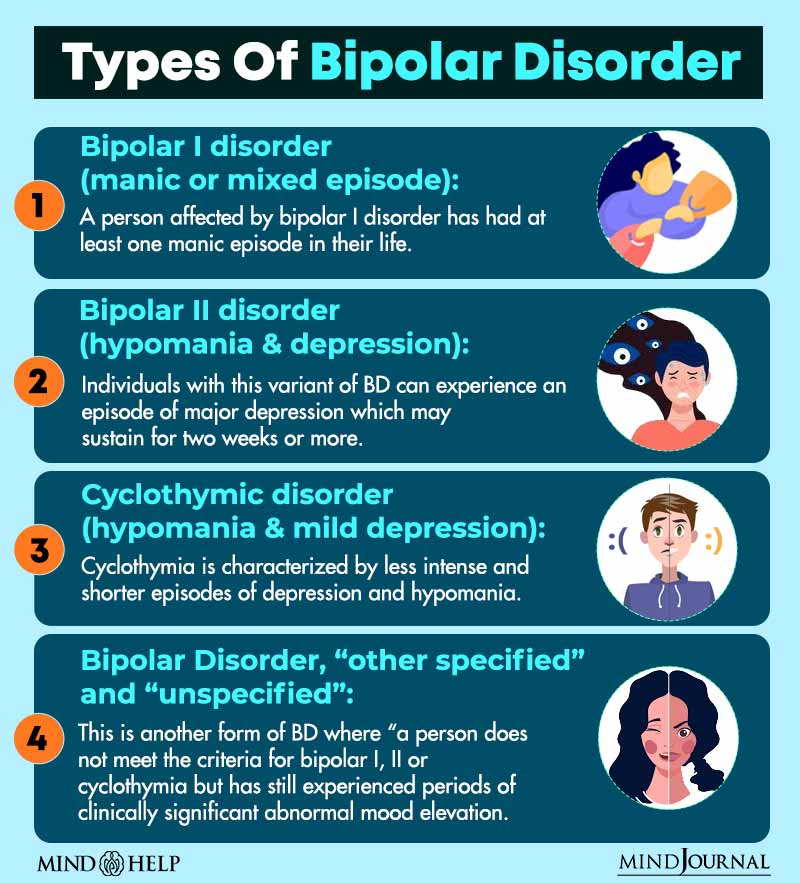
There are 3 different types of bipolar disorder and all the variations involve drastic shifts in mood and energy levels.
1. Bipolar I disorder
Involves episodes of intense mania preceded or followed by severe depression. You may also experience psychosis or a loss of contact with reality.
2. Bipolar II disorder
Involves a less intense form of mania known as hypomania preceded or followed by severe depression.
3. Cyclothymic disorder
Also known as Cyclothymia, it involves symptoms of hypomania and depression for a period of at least 2 years in adults and 1 year in children & adolescents.
There are other specified and unspecified bipolar and related disorders, where the sufferer may not meet the diagnostic criteria for the other 3 types, but still experiences episodes of abnormal mood swings.
It should be noted that he tenth edition of the International Classification of Diseases (ICD-10) “does not discriminate between bipolar disorder types I and II.”
Related: What Is Manic Depression?
Symptoms of bipolar disorder
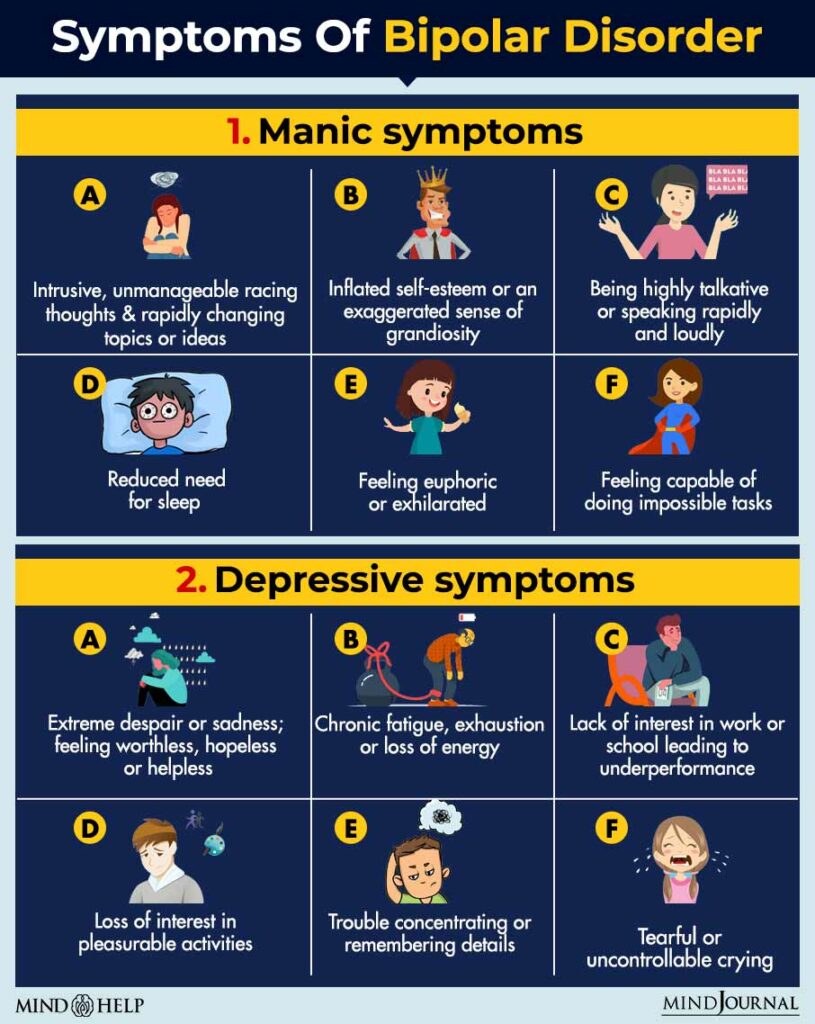
Although symptoms can vary depending on the intensity and frequency of the condition, there are several common manic and depressive symptoms of bipolar disorder that can be observed in someone with BD. Some of common bipolar disorder symptoms are mentioned below-
1. Manic symptoms
- High levels of energy
- Feeling euphoric
- Inflated self-esteem
- Decreased need for sleep
- Risky behavior like having unprotected sex or spending sprees
- Speaking rapidly or loudly
- Being highly active or productive
- Extremely high spirited
- Being excessively irritable
- Feeling bored easily
- Substance abuse
- Delusions & hallucinations (in rare cases)
2. Depressive symptoms
- Intense sadness
- Anxiety
- Hopelessness or helplessness
- Loss of interest in pleasurable activities
- Listlessness
- Irritability
- Changes in sleep and appetite
- Indecisiveness
- Uncontrollable crying
- Exhaustion & loss of energy
- Feeling guilt or shame
- Suicidality or self-harm
Do you have bipolar disorder? Take this quick bipolar disorder test to find out.
Causes of bipolar disorder
So what causes bipolar disorder? Although researchers are yet to determine the exact causes for the development of the bipolar disorder, it is believed that mental illness is influenced by a number of different factors. Here are some factors that may contribute to the onset of manic bipolar disorder –
1. Genetic factors
Studies show that people with a family history of BD can develop this condition. Hence, if you have a first-degree family member with bipolar I or bipolar II, then you have a 10-fold increased risk for developing bipolar disorder. “The risk of bipolar disorder is 10-25% when one parent has a mood disorder,” explains a research paper.
2. Biological factors
Brain structure & functioning can also influence the onset of BD as imbalance in hormones and neurotransmitters can affect the brain. Studies show that bipolar disorder can be “characterized by dysregulation in the dopamine and serotonin systems and by pathology in the brain systems involved in regulating emotion.” Moreover, BD can also appear due to the following neurological conditions –
- Stroke
- Multiple sclerosis
- Traumatic brain injury
- Temporal lobe epilepsy
- HIV
- Porphyria
3. Environmental factors
Environmental and psychosocial factors can also play a strong role in the development of bipolar mood disorder. External factors and adverse life events may trigger the symptoms in someone with genetic dispositions or imbalanced brain chemicals. The following life events can trigger the onset of bipolar disorder –
- Excessive stress
- Anxiety
- Loss of a loved one
- Physical or sexual assault
- Relationship abuse
- Sleep deprivation
- Financial issues
- Abandonment and neglect
- Breakup or divorce
4. Substance abuse
Excessive use of alcohol, substances, or certain medications can also lead to the development of bipolar disorder. Substance use can worsen the symptoms and adversely affect recovery.
Related: What You Should Know About Hypomania
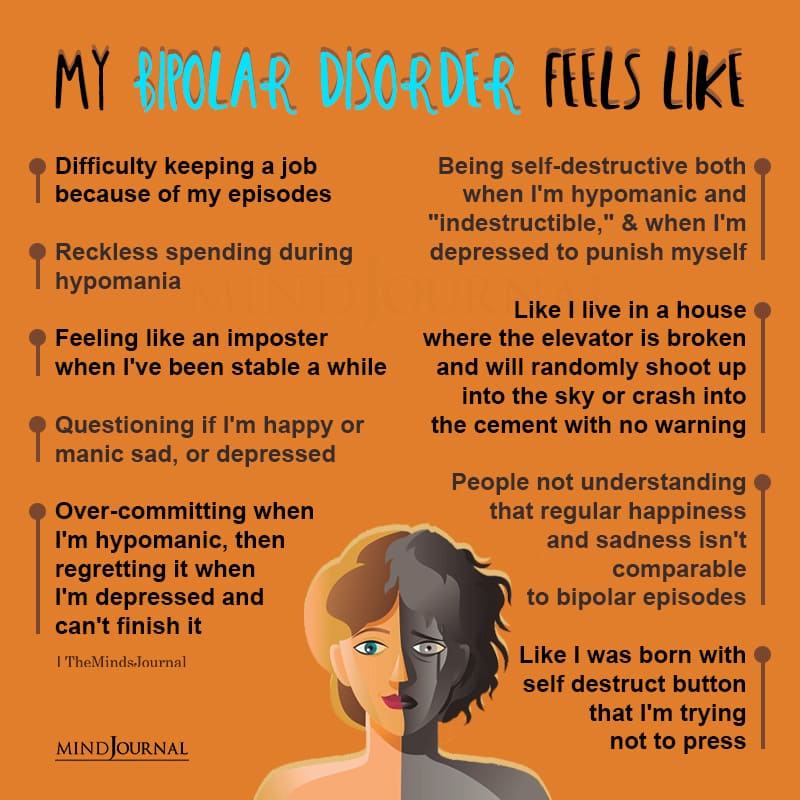
Co-occurring disorders
Studies show that bipolar disorder is “associated with high rates of medical illness.” If you are suffering from bipolar disorder, then you may also develop other physical or mental health issues as well. Common comorbid conditions include –
- Anxiety disorders
- Posttraumatic stress disorder (PTSD)
- Obsessive-compulsive disorder (OCD)
- Generalized anxiety disorder (GAD)
- Attention-deficit hyperactivity disorder (ADHD)
- Personality disorders
- Panic disorder
- Eating disorders
- Impulse control disorders
- Psychosis
- Diabetes and obesity
- Heart disease
- Substance abuse
- Suicidal ideation
Co-occurring disorders in sufferers are related to “poorer outcome and poorer treatment response, increased service utilization, and increased cost,” explains one 2006 study.
Related: Manic Depression: 10 Facts You Should Know About It
Diagnosis and tests
Although there are no specific tests to diagnose bipolar disorder, a mental health professional might conduct certain tests, such as –
- Blood tests
- Thyroid hormone levels
- ESR levels
- Protein levels
- Electrolyte levels
- CBC count
- HIV testing
- Substance and alcohol screening
- Liver and lipid panel
- VDRL testing
- Fasting glucose levels
Other than a physical exam, a doctor may also check the patient’s medical history & family history, and ask about their symptoms and life experiences to better understand the patient. They may also conduct a mental health evaluation as well.
However, to be diagnosed with BD, it is required that you experience at least one episode of hypomania or mania followed by a period of depression.
Related: Types, Symptoms, and Treatment Of Manic Depression
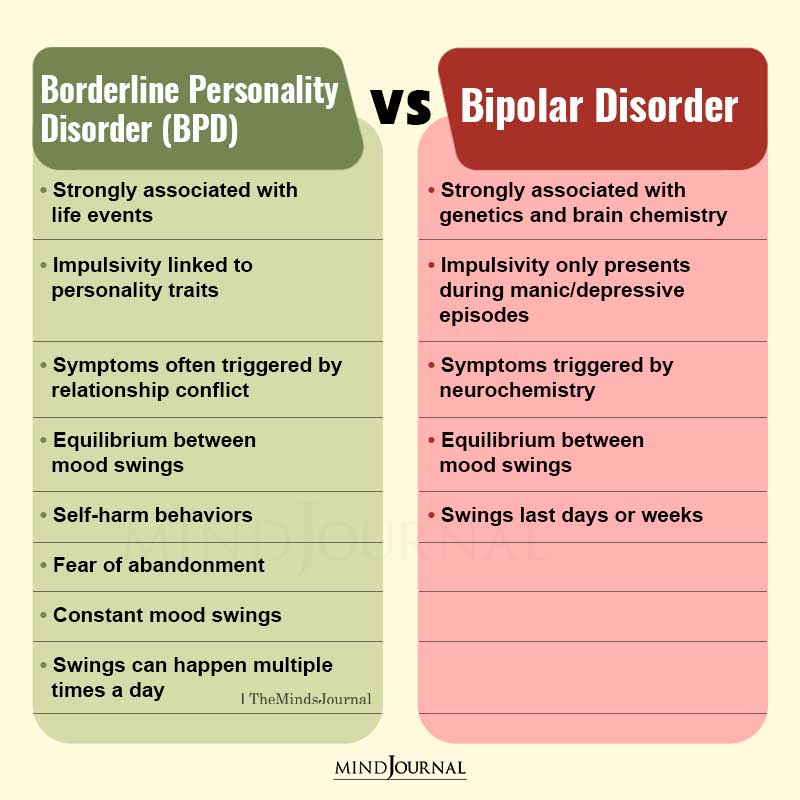
Treatment of bipolar disorder
Bipolar disorder can be treated with a number of different approaches, like therapy and medication. These can effectively manage the symptoms and enable you or your loved one to live a more fulfilling and productive life. Studies show that “combining the use of medication with psychoeducational therapy is more effective at preventing a recurrence of illness in people with bipolar disorder than medication alone.”
Some of the most effective bipolar disorder treatment options for bipolar disorder include –
1. Psychotherapy
Psychotherapy or talk therapy involves different psychological intervention strategies which can empower the patient to understand and identify their shifting thoughts, emotions, moods, and behaviors and regulate them better. Research has found that “optimum management of bipolar disorder needs integration of pharmacotherapy with targeted psychotherapy.”
Here are some of the most common and effective therapy approaches for treating bipolar disorder –
A. Cognitive-behavioral therapy (CBT)
CBT enables sufferers to recognize the patterns of their own thoughts and behaviors and replace harmful behavior with positive and healthy habits. It can help the patient to better cope with anxiety, stress & other negative triggers. One 2017 study has found that “CBT is effective in decreasing the relapse rate and improving depressive symptoms, mania severity, and psychosocial functioning.”
B. Family-focused therapy (FFT)
Family therapy focuses on involving and helping both the patient and their family. FFT helps family members and romantic partners to provide better support to the patient and help the treatment process. Studies reveal that FFT can be “an opportunity for patients to gain control over concurrent episodes while building skills that might prevent or decrease the impact of future episodes.”
C. Interpersonal and social rhythm therapy (IPSRT)
This psychological intervention has been specifically designed for treating BD. It helps to improve the disruptions in our circadian rhythm and encourages the patient to follow a daily routine which can stabilize their mood. Researchers claim that IPSRT can be “a clinically effective adjunctive intervention to medication.”
D. Psychoeducation
It enables the sufferer and family members to understand the mental illness better so that communication and support can be improved. Research shows that psychoeducation can help with the recovery process and can be considered “a first-line psychological intervention,” when delivered individually or in a group setting.
Related: What Is Psychotherapy: Techniques, Types And Benefits
2. Medications
Certain medications are available that can help in managing the symptoms of bipolar disorder. Medication can stabilize your mood, reduce stress and anxiety and help you sleep better. Commonly prescribed medications for bipolar disorder include –
- Mood stabilizers
- Anti-seizure medications
- Antipsychotic Medications
- Anti-anxiety Medications
- Antidepressants
Lithium, a type of mood stabilizer, is considered as the gold standard for bipolar treatment. “After more than 60 years, lithium remains the first-line treatment for prevention of manic and depressive episodes of bipolar disorder (BD),” explains a 2015 study.
3. Electroconvulsive therapy (ECT)
ECT, also called electroshock therapy, is a safe and effective procedure that is recommended when other treatment options have proven unsuccessful. It attempts to reboot your brain by sending small degrees of electrical currents to induce a controlled seizure. This can help to reduce the symptoms rapidly. “Electroconvulsive therapy for bipolar depression was associated with very high response rates,” states a 2019 study.
Coping strategies for bipolar disorder
Apart from therapy and medication, there are certain self-help techniques that can help you or your loved ones to cope with BD. Some of these coping techniques include-
- Using certain supplements and herbs like fish oil, rhodiola rosea, etc
- Practicing relaxation techniques like mindfulness meditation, deep breathing, yoga, etc
- Eating a nutritious diet
- Getting at least 7-8 hours of sleep every night
- Maintaining a daily routine
- Staying physically active
- Practicing journal writing and note down your thoughts
- Avoiding alcohol and substances
- Pursuing your passions and interests
- Socializing more often
- Practicing self-care and address your needs
- Asking for support from loved ones
- Seeking medical help, when needed
If you are having suicidal ideation, then make sure to seek help immediately.
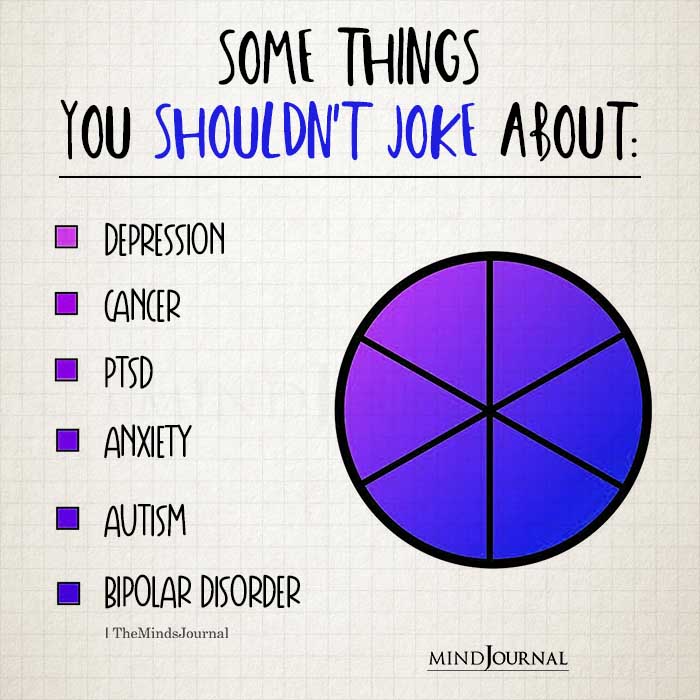
Takeaway
Although living with bipolar disorder can be challenging, following a treatment plan, having a support system, and practicing self-care can help someone to recover and manage their symptoms. If you or someone you know is suffering from BD, then make sure to consult a licensed mental health practitioner immediately.
Related: Are Mood Disorders the Price We Pay for High Intelligence and Creativity?
Frequently Asked Questions (FAQs):
How to get assistance with bipolar disorder, stress, anxiety, and depression?
If you think you are suffering from bipolar disorder, then make sure to talk to some trusted loved ones like friends and family members. They can help you get the necessary medical support.
What should family and peers know about bipolar disorder in youth?
It is important to know that bipolar disorder is a serious mental health condition that can develop due to genetic predisposition. It is also important to know that medical treatment can effectively help in managing symptoms.
Is it possible to heal from bipolar disorder without prescription medication?
Although self-help strategies can support recovery, therapy and medications under the guidance of a licensed mental health professional is necessary for proper treatment.
How can a family member help a patient deal with bipolar disorder?
If your loved one has bipolar disorder, then start by educating yourself about it. Try to be more understanding and empathetic in your interactions and encourage them to seek medical help.
Is it the right thing to bury down your bipolar depression?
Hiding your symptoms or suppressing your emotions can make the condition worse in the long run. It is always advisable to seek medical help and talk to loved ones about your thoughts and emotions.
What role does brain structure play in depression and bipolar disorder?
Imbalance in hormones and neurotransmitters in the brain can lead to the development of BD. Moreover, bipolar disorder can shrink the hippocampus in the brain.
What is the difference between Histrionic personality disorder and bipolar disorder?
Histrionic personality disorder (HPD) is a personality disorder where the sufferer has a distorted self-image. Bipolar disorder is a mood disorder that causes rapid mood swings.
Is bipolar a personality disorder?
Although bipolar disorder can affect our personality, it is medically considered as a mood disorder and not a personality disorder. Hence, the term bipolar personality disorder is not widely used.
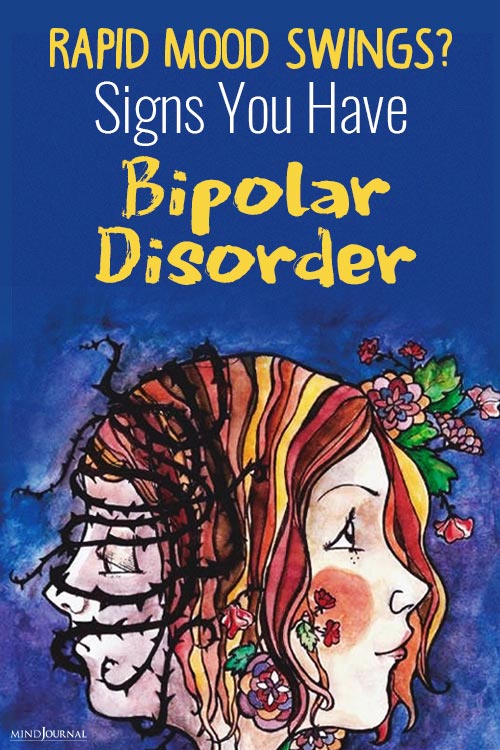
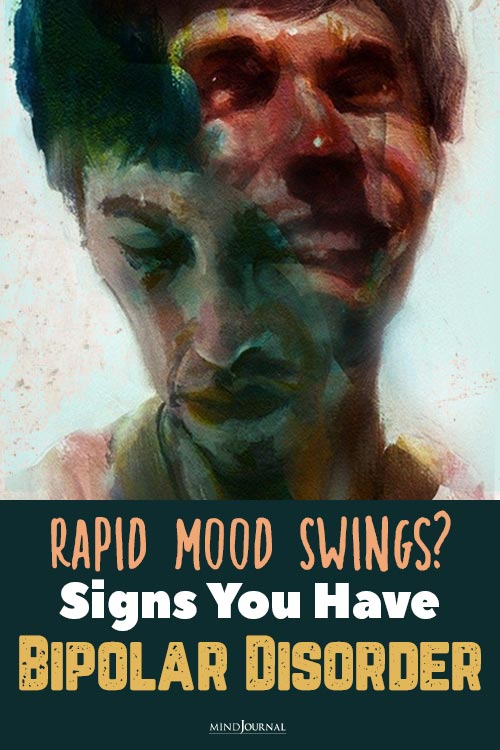






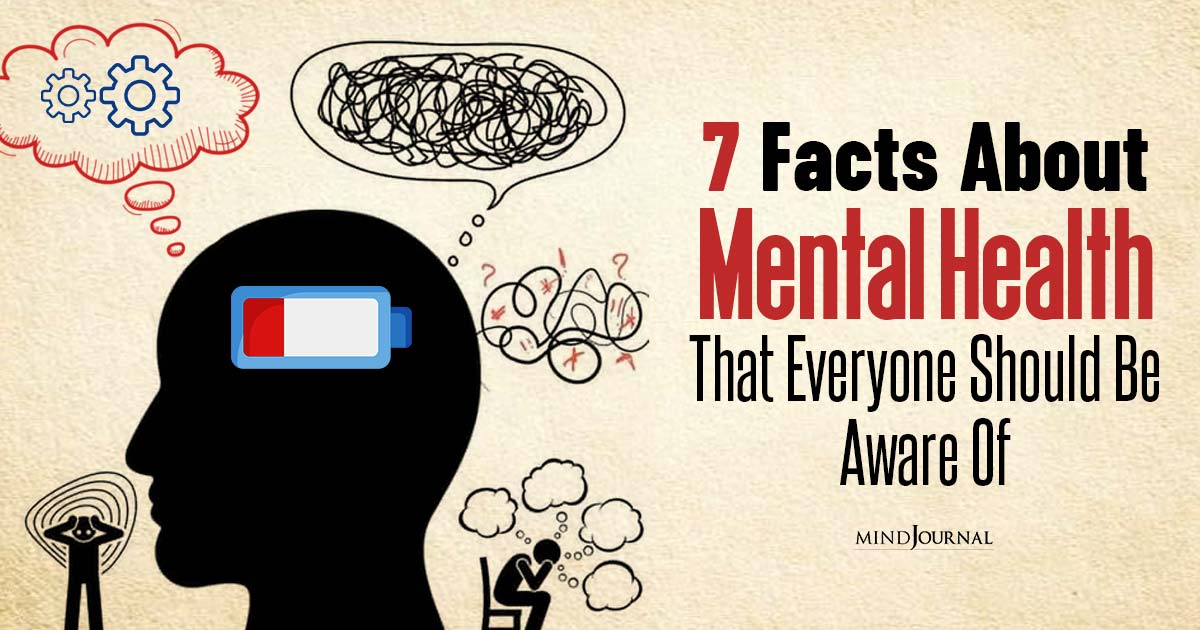

Leave a Reply
You must be logged in to post a comment.